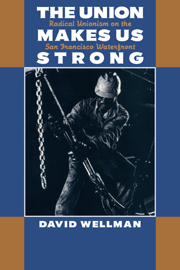Book contents
- Frontmatter
- Contents
- Preface
- Notes on unpublished sources
- PART I LABOR RADICALISM REVISITED
- PART II LOCAL COMMUNITY AND “TUMULTUOUS” DEMOCRACY: THE SOCIOCULTURAL FOUNDATIONS OF UNIONISM ON THE SAN FRANCISCO WATERFRONT
- PART III UNIONISM, WORK, AND TECHNOLOGICAL CHANGE
- PART IV WAGING THE BATTLE FOR WORKPLACE CONTROL ON CONTRACTUAL TERRAIN
- 10 Who decides how to work?
- 11 Which side's language shall govern?
- 12 By whose principles will merit be rewarded?
- PART V AGREEING TO DISAGREE: BEING DEFENSIBLY DISOBEDIENT
- Conclusion: Trade union exceptionalism or prefigurative politics?
- Appendix: Doing field research: An ethnographic account
- References
- Name index
- Subject index
12 - By whose principles will merit be rewarded?
Published online by Cambridge University Press: 11 November 2009
- Frontmatter
- Contents
- Preface
- Notes on unpublished sources
- PART I LABOR RADICALISM REVISITED
- PART II LOCAL COMMUNITY AND “TUMULTUOUS” DEMOCRACY: THE SOCIOCULTURAL FOUNDATIONS OF UNIONISM ON THE SAN FRANCISCO WATERFRONT
- PART III UNIONISM, WORK, AND TECHNOLOGICAL CHANGE
- PART IV WAGING THE BATTLE FOR WORKPLACE CONTROL ON CONTRACTUAL TERRAIN
- 10 Who decides how to work?
- 11 Which side's language shall govern?
- 12 By whose principles will merit be rewarded?
- PART V AGREEING TO DISAGREE: BEING DEFENSIBLY DISOBEDIENT
- Conclusion: Trade union exceptionalism or prefigurative politics?
- Appendix: Doing field research: An ethnographic account
- References
- Name index
- Subject index
Summary
EXCEPT for the people affected directly, disputes over pay and promotion are rarely viewed as deep disagreements between employers and unions. Rather, they are considered expressions of greedy, narrow-minded, self-interested economics, examples of the “mere” in Gompers's “mere economism.” But regardless of how much importance is attributed, or not attributed, to monetary differences, most of labor's observers agree that the issue in these disputes is not workplace control. In fact, it is often assumed that labor's right to make financial claims is its reward for relinquishing control over the workplace.
A different understanding emerges, however, when one observes disputes over pay and promotion in settings of their most routine occurrence: in negotiations defining a fair day's pay, choosing supervision, and determining skill. In this context, the two sides argue about the grounds for promotion and the bases for salary differentiation. These arguments reveal a third front in the battle over workplace control. The two sides disagree over principles for acknowledging merit. The issue is hardly narrow or merely economic. The gap between the union and management is as wide as the differences are deep. The dispute is, whose principles for promotion and pay will prevail?
HOW MUCH MONEY? FAIRNESS VERSUS HIERARCHY AS PRINCIPLES FOR DETERMINING PAY
When the two sides talk about wage scales during contract negotiations, it becomes clear that pay disputes extend beyond money. As local negotiations were concluding, the PMA and IEWU representatives remained deadlocked over a wage rate for gearmen.
- Type
- Chapter
- Information
- The Union Makes Us StrongRadical Unionism on the San Francisco Waterfront, pp. 242 - 252Publisher: Cambridge University PressPrint publication year: 1995



